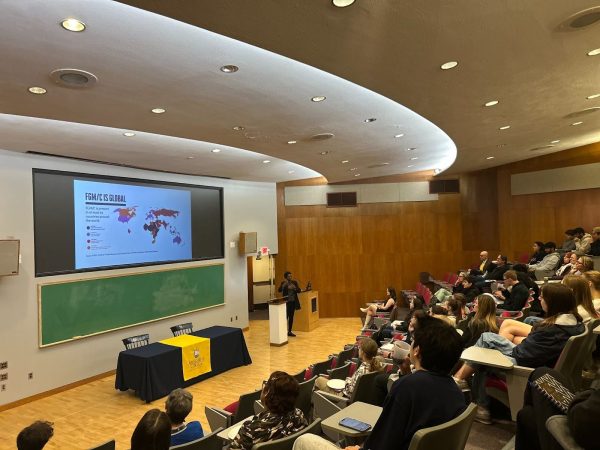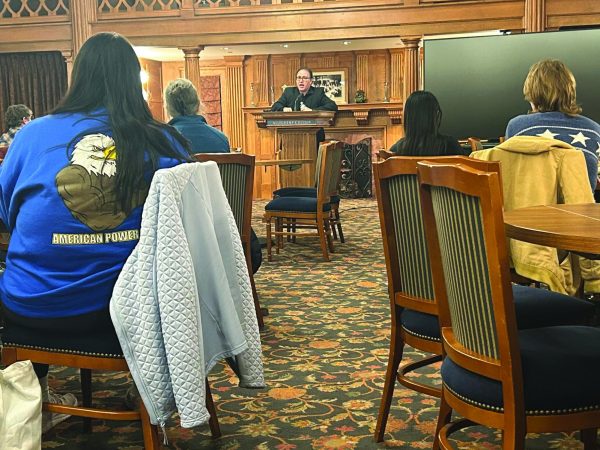Monks’ visit to campus upsets Chinese students due to political associations
The presence of the monks on campus highlighted political tensions and the conflicting history between Tibet and China and caused some of the Chinese students to feel upset and uncomfortable.
Sen Rong, ’20, said that although as an art major he loved the art and enjoyed learning about the skills and techniques behind the sand painting, he was shocked and upset with the political side to the monks visit.
“They said Tibet is a unique country. That was awful because I am Chinese and I think Tibet is part of China,” Rong said. “It is not an arguable question for us about Tibet.”
Xingbang Liu, ’20, said that the Chinese students agree that these kind of art exhibitions should be held on campus, however without the political ramifications.
“The U.S. government agreed … that Tibet is part of China since 1979,” Liu said. “In this case they say Tibet is not part of China and ‘free Tibet’.”
Liu said it was important for people to recognize that the Chinese students do not share the same history and culture as Americans.
Tibet has been under the control of the Chinese government since 1271, according to Liu. He said in the People’s Republic of China, the central government signed a 17 point agreement for the peaceful liberation of Tibet in 1951, and in 1956, a committee — which the Dalai Lama was the chairman of — was set up to prepare Tibet to become an autonomous region. In 1959 the local Tibetan government betrayed the agreement and held an armed rebellion. The Dalai Lama then fled Tibet following this rebellion.
Liu said a couple of students reached out to Dean of Students Kimberly Ferguson and the two main organizers of the event Chaplain Jane Ellen Nickell and Associate Professor of English Jennifer Hellwarth to express their concerns about the monks’ presence on campus.
“This situation which could hurt our feelings shouldn’t exist,” Liu said. “Our main point is that we [are] not against arts and [religion], we [are] just against the politic involved in it.”
Tibetans tend to disagree with this account of history, according to Time magazine. BBC.com states that “Tibet has a tumultuous history, during which it has spent some periods functioning as an independent entity and others ruled by powerful Chinese and Mongolian dynasties.”
Tibet was an independent state from 1912 to 1950 when China enforced a long-held claim to the country and sent thousands of troops into Tibet to enforce this claim, according to BBC.com.
In 1951 Tibetan leaders were forced to sign the “Seventeen Point Agreement for the Peaceful Liberation of Tibet” which “professes to guarantee Tibetan autonomy and to respect the Buddhist religion, but also allows the establishment of Chinese civil and military headquarters at Lhasa,” says the BBC website.
The Dalai Lama fled for India and set up government there after a failed anti-China uprising in 1959. The BBC states that most of Tibet’s monasteries were destroyed in the 1960s and 1970s and that it is believed that thousands of Tibetans have been killed during periods of repression and martial law.
The Freedom House “Freedom in the World 2016” report ranked Tibet second to last with its aggregated score of political rights, civil liberties and general freedom rating, with Syria being the only country ranked lower. Tibet scored a 1 out of 100 with 0 being the worst and 100 being the best.
Since the Dalai Lama left Tibet, there have been various attempts at communication between Beijing and the Dalai Lama. No outside country openly disputes China’s claim to sovereignty over Tibet, according to BBC.com.
Xiaoyu Zhu said she understands the complex nature of situation and that not everyone will agree on what the truth is, but that the Chinese population on campus wish their opinions and feelings were not overlooked by the college.
“We are [a] minority of this school,” Zhu said. “We just want to know if that means our voice is not important.”
Zhu said the most problematic aspect of the monks visit was the “Free Tibet” flag present in the gallery during the show. She said the students intend to write a letter to the school detailing their opinions and perspective to help educate and to ensure their voices are heard.
“We don’t want to say ‘you are wrong and our opinion is right,’ we just want to let the school [hear] our voice,” Zhu said.
Medha Nag, ’20, is an international student from India who said that although she can understand the Chinese student’s sentiment, she believes Buddhism stands for peace.
“These monks — they came in and it was a very peaceful thing,” Nag said. “I feel like we shouldn’t be bringing world politics into something that’s so beautiful and so artistic and creative. Especially in our world today.”








ETW • Mar 12, 2017 at 6:41 pm
Bah. These complaints seem silly, at best, and mendacious, at worst.
Am I missing something here?